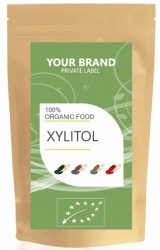Info
Some of the health benefits of XYLITOL include its ability to control glucose and insulin levels in the body, manage diabetes, reduce bacterial growth, improve the health of gums and teeth, prevent overeating, help in weight loss efforts, fight off dangerous viruses, eliminate ear infections, boost sinus health, build strong bones, strengthen the immune system, reduce ulcers, prevents bad breath, and even protects against stomach cancer.
When people first read the name xylitol, the natural response is to think of it as a highly processed, chemically-based substance that couldn’t possibly be good for health! However, despite the somewhat misleading name, xylitol is actually a very valuable tool for increasing our overall health.
As a sugar substitute, xylitol contains no vitamins or minerals. It contains carbohydrates, calories, and a variety of organic compounds that affect the body. While it has long been used simply as a hyperglycemia-safe sweetener, recent studies have revealed many more important health benefits that it can confer on the body.
One of the most common afflictions of modern life is diabetes. Perhaps this is because of an increase in high-fat diets around the world, or a globalization of fast food, or the generally high-paced life that doesn’t allow people to eat properly, but the problem remains. Therefore, any solution that can help manage diabetes, which is an inability of the body to properly maintain insulin and glucose levels throughout the body, is very important.
Xylitol is a chemically processed form of sugar, meaning that the body cannot break down the carbohydrates into simple sugars and flood the bloodstream with it, thereby throwing off the balance of insulin and glucose. This means that diabetic patients can consume xylitol in all of their normal foods without the fear of huge plunges or spikes in blood sugar levels.
In a similar vein to the antibacterial qualities explained above, xylitol has been shown to be very good for oral health. Some of the world bacterial strains, like Streptococcus bacilli, can be neutralized by xylitol, thereby preventing infections in the mouth. Also, xylitol has been found to reduce plaque, as well as caries and cavities.
When people first read the name xylitol, the natural response is to think of it as a highly processed, chemically-based substance that couldn’t possibly be good for health! However, despite the somewhat misleading name, xylitol is actually a very valuable tool for increasing our overall health.
As a sugar substitute, xylitol contains no vitamins or minerals. It contains carbohydrates, calories, and a variety of organic compounds that affect the body. While it has long been used simply as a hyperglycemia-safe sweetener, recent studies have revealed many more important health benefits that it can confer on the body.
One of the most common afflictions of modern life is diabetes. Perhaps this is because of an increase in high-fat diets around the world, or a globalization of fast food, or the generally high-paced life that doesn’t allow people to eat properly, but the problem remains. Therefore, any solution that can help manage diabetes, which is an inability of the body to properly maintain insulin and glucose levels throughout the body, is very important.
Xylitol is a chemically processed form of sugar, meaning that the body cannot break down the carbohydrates into simple sugars and flood the bloodstream with it, thereby throwing off the balance of insulin and glucose. This means that diabetic patients can consume xylitol in all of their normal foods without the fear of huge plunges or spikes in blood sugar levels.
In a similar vein to the antibacterial qualities explained above, xylitol has been shown to be very good for oral health. Some of the world bacterial strains, like Streptococcus bacilli, can be neutralized by xylitol, thereby preventing infections in the mouth. Also, xylitol has been found to reduce plaque, as well as caries and cavities.



 NO PARABENS AND PH NEUTRAL
NO PARABENS AND PH NEUTRAL Vegan product,
Vegan product, SELECTED NATURAL
SELECTED NATURAL MODERN production
MODERN production